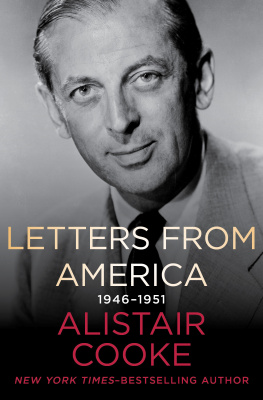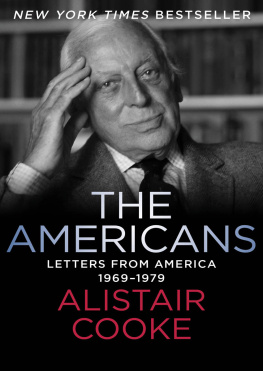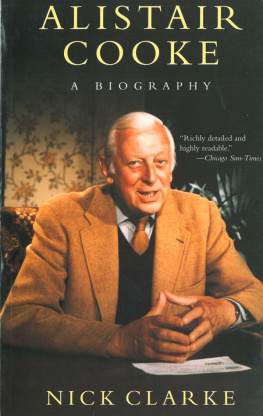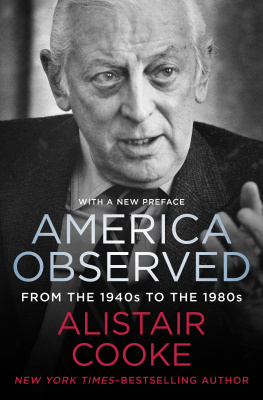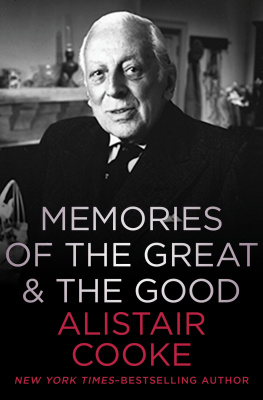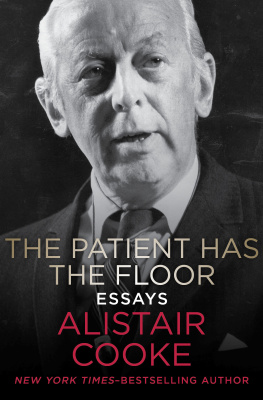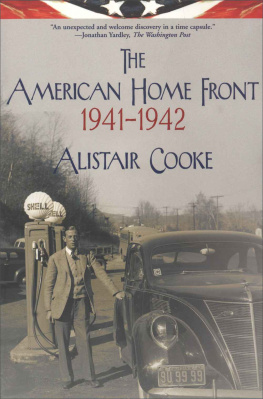PENGUIN BOOKS
ALISTAIR COOKES AMERICAN JOURNEY
A brilliant portrait Evening Standard
Splendidly vivid he has the true reporters ability to make you feel you were there This book should be read by anyone interested in that phenomenon that is the United States of America Allan Massie
Skilfully illuminates life on the American homefront his narrative is rich and full of admiration for American individuals willingness to play their part, however small Metro London
While the rest of the journalistic pack nibbled at news releases back in Washington, he followed his instincts and took a good look around the rest of the country. He filed late, but boy, did he get it right The New York Times
A letter from the front lines, and the immediacy of it is real and valuable Washington Post
The incredible fact is that it went unpublished for sixty years an engaging and insightful book, and something like reading a history and a historical document at the same time Chicago Sun Times
A unique document of war from the master of the avuncular fireside chat Daily Telegraph
Cooke was, first and last, a great reporter. If we needed yet more proof of that it is here in his American Journey John Humphrys
American Journey has everything you might expect from one of the greatest journalists and broadcasters in history The writing is perceptive, articulate, observant and shrewd, and much more Gavin Esler
ABOUT THE AUTHOR
Alistair Cooke enjoyed an extraordinary life in print, radio and television. He was born in Manchester in 1908 and educated at the universities of Cambridge, Yale and Harvard. Throughout his long career he worked as a journalist and broadcaster for many different organizations including the BBC, The Times and the Guardian, and won numerous awards for his work. He is best known both at home and abroad for his weekly Letter from America, far and away the longest-running radio series in broadcasting history. He died in March 2004, just a few weeks after his retirement. Letter from America, a definitive selection of the Letters, is also published by Penguin.
Alistair Cookes American Journey
Life on the Home Front in
the Second World War
with a Foreword by
Harold Evans

PENGUIN BOOKS
PENGUIN BOOKS
Published by the Penguin Group
Penguin Books Ltd, 80 Strand, London WC2R 0RL, England
Penguin Group (USA) Inc., 375 Hudson Street, New York, New York 10014, USA
Penguin Group (Canada), 90 Eglinton Avenue East, Suite 700, Toronto, Ontario, Canada M4P 2Y3
(a division of Pearson Penguin Canada Inc.)
Penguin Ireland, 25 St Stephens Green, Dublin 2, Ireland
(a division of Penguin Books Ltd)
Penguin Group (Australia), 250 Camberwell Road,
Camberwell, Victoria 3124, Australia (a division of Pearson Australia Group Pty Ltd)
Penguin Books India Pvt Ltd, 11 Community Centre,
Panchsheel Park, New Delhi 110 017, India
Penguin Group (NZ), 67 Apollo Drive, Rosedale, North Shore 0632,
Auckland 1310, New Zealand (a division of Pearson New Zealand Ltd)
Penguin Books (South Africa) (Pty) Ltd, 24 Sturdee Avenue,
Rosebank, Johannesburg 2196, South Africa
Penguin Books Ltd, Registered Offices: 80 Strand, London WC2R 0RL, England
www.penguin.com
First published by Allen Lane 2006
Published in Penguin Books 2007
1
Copyright the Estate of Alistair Cooke, 2006
Foreword copyright Harold Evans, 2006
All rights reserved
The moral right of the author has been asserted
EISBN: 9780141904726
Contents
Acknowledgements
The Estate of Alistair Cooke would like to thank those who have made the publication of this book possible.
Patti Yasek, who found the manuscript at the bottom of a crowded closet in Alistair Cookes New York apartment, when clearing through other papers, just a few weeks before the authors death and was able, at the speed of light, to retype it ready for editing; Colin Webb, Mr Cookes book editor and literary executor, who responded to his request to arrange this publication; George Perry, who provided the first assessment of the manuscript and recognized the considerable value of the content; Walton Rawls, who has edited, with distinction and understanding, the original manuscript ready for press; John Byrne Cooke, who has archived Mr Cookes photographs and has expertly provided the images published in this volume together with notes that have informed the captions; Stuart Proffitt, publishing director of Penguin Press and Morgan Entrekin, the publisher, and Jamison Stoltz, the editor, at Grove Atlantic, who have enthusiastically encouraged us all.
List of Illustrations
: Portrait of Alistair Cooke by Ray Lee Jackson, early 1940s.
: Letter of introduction issued by the BBC, 1942.
PLATE SECTION
Newspapers bought by Alistair Cooke, August 1415 1941.
Alistair Cooke with his car, 1942.
A closed gas station in California, 1942.
Manzanar Japanese-American relocation camp in Owens Valley, California, 1942.
Children playing at Manzanar Relocation Camp, 1942.
Lettuce field, Salinas Valley, California, 1942.
Cattle in Eastern Colorado, 1942.
Grain elevators in Kansas, 1942.
Combine-harvesting wheat, Kansas, 1942.
New England Town, fall 1942.
Alistair Cooke at the 1876 battlefield cemetery, 1942.
New York City, late 1941.
San Francisco during the UN organizing conference, 1945.
. Alistair Cooke with two English servicemen by the Pacific Ocean, Santa Monica, California, 1942.
: Alistair Cooke with American airman, 1943.
All illustrations are copyright the Estate of Alistair Cooke except the frontispiece, where the copyright holder is untraced.
Foreword
Wartime Britain, though few nowadays have a personal memory of those years, is fairly well etched into our collective imaginations: the silent blacked-out streets, the night skies lit by beams searching for bombers; the raucously cheerful Workers Playtime lunch-hour concerts broadcast from a factory somewhere in the North; the boxed gas masks on every scurrying shoulder; the nightly pip-pip-pip preceding BBC Radio bulletins, where the only consolation for the invariably bad news was that the unshaky baritone of the announcer Alvar Lidell suggested that somehow there would always be an England. There was a palpable sense of isolation, and then there was the marvellous moment when Mr Lidell at last had something good to relate. America had entered the war.
Nobody in Britain had much more than the foggiest notion then what the Americans might bring to the war, or indeed what Americans were really like: there was just a palimpsest of Franklin Roosevelt/Charlie Chaplin/John Steinbecks Okies. Saul Steinbergs famous New Yorker cartoon was drawn years later but summed up the perspective then and now, the skyscrapers of Manhattan distended westwards to Hollywood and the Pacific, with something vague and dusty in between. The arrival in ration-book Britain of GIs armed with the temptations of nylon stockings and cartons of cigarettes excited more envy than curiosity; after all, they came in late last time, took the credit for whipping the Kaiser didnt they? and they were coming in late again.
What was happening in the vast mystery of America was, of course, of supreme importance and more than passing interest, as that new American citizen Alistair Cooke realized at the time. Having worked in London as the BBCs film critic, he had returned to America in 1937 in time to hear the drum rolls of war reaching Washington from the Far East; he was in the capital for Pearl Harbor on December 7, 1941; and then on the morning of February 27, 1942 he left the air of tobacco-choked energy that is the Washington odor of panic. For saking the hot news from the capital, he set out on a prodigious journey to explore the country, south, west, north and east. On the first trip he drove much of the way in a car with five retreads, then in 1943 and 1944 he did the trip again by train and bus. Only a handful of Americans have seen the country like that, still less reflected on its diversities. There is nothing weird about the doctor he meets in St Louis who tells him, I never was west of Louisville nor east of Charleston, West Virginia.


